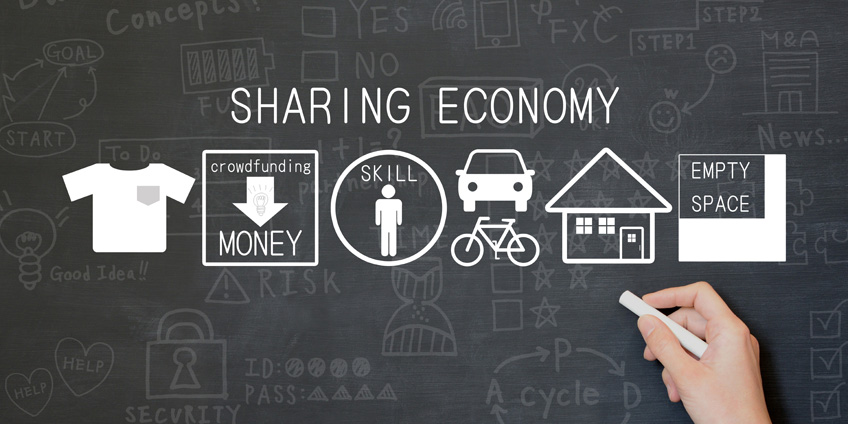7 billion Uber trips. 144 million paying Spotify users. 5.6 million properties on Airbnb¹
With changing attitudes and enabled by advances in technology, leasing assets instead of owning is one of the powerful trends that we see impacting us now and in the immediate future. The ‘sharing economy’ model challenges the traditional notions of private ownership. Ownership of physical assets is losing its seductive power for those entering the market and the perceived linkage between ownership and wealth is withering. It is no longer of the utmost priority for millennials as they instead value access, experience and flexibility than owning material possessions. Home ownership, for example, is becoming increasingly inaccessible with 100% increase in London house prices over the course of a decade², enabling sharing and rental markets to soar. From Airbnb’s home-sharing and Uber’s ride-sharing model to pay-as-you-go Cloud computing, technology and social media have been turning the sharing economy model into a big business. While sharing economy has witnessed challenges due to the pandemic, these are not intrinsic to the sharing model alone. Travel and hospitality industries at large are hit hard due the virus outbreak. There is little reason to believe that covid-19 will put an end to the sharing economy businesses. Instead, it will only reshape the sharing economy as these companies adapt to the changed consumer demand and cope better than their traditional counterparts.
Can you really afford to buy anything in today’s economy?
The current economic climate we face in the wake of the pandemic is one that further accentuates the point that buying may no longer be an option and we have pivoted into what is now known as ‘Generation Rent’. Constant inflationary pressures on housing especially within metropolitan areas is one of the fundamental reasons for many people being priced out of the buying market. Looking at an example of London, it shows that housing prices have doubled in a ten-year period, much higher than inflation and wage rates. Renting which was once considered as a ‘waiting room’ for ownership, might now because of the pandemic be a ‘comfort lounge’ for a longer period. Also, when it comes to transportation, renting or sharing a car allows users to enjoy the services without being bothered about the parking costs, MOT charges, insurance costs and congestion charges, while providing gig workers the flexibility to work anytime and from anywhere. However, policymakers across the world need to focus on also providing social safety net to these workers who miss out on the regular perks and benefits of a full-time job.
Share to reduce the carbon footprint
Today’s generation is perhaps more attuned and involved in environmental friendly practices and lifestyles than past generations. Not only is ride sharing easier and cost effective but also makes more sense for individuals from a carbon footprint standpoint. More people using ride sharing services or hiring pay-as-you-go bicycles will help to reduce greenhouse gas emissions and traffic congestion. Also, as commuters become wary of using public transport due to the fear of the virus, private cabs like Uber, Ola; bike hire companies like Jump, Lime and rental scooters like Bird have seen a surge in demand as these are considered safe and environment friendly commuting solutions. Olio, a London based free sharing app born out of the pandemic allows its users to give away food and other household items to their neighbours for free. Around 2.6 million users have joined Olio on its mission to fight food wastage and save our planet in the process.
More people using ride sharing services or hiring pay-as-you-go bicycles help to reduce greenhouse gas emissions and traffic congestion.
How Sharing Economy has changed during the pandemic?
With consumer habits undeniably changing, it is imperative for firms to adapt their structures and offerings to meet the demand in this changed business climate. While more people spend time at home, Uber has now for instance turned to its food delivery business Uber Eats that has reported a 30% increase in its customer base³. Another example is Amazon Flex, a sharing package delivery service, which has seen a surge in number of drivers as new gig jobs have become available&sup4;.
Although there still seems uncertainty due to pandemic, data shows that sharing economy based businesses are back on track. For example, Airbnb found that guests are looking for rentals in neighbouring towns and cities to avoid air travel. Airbnb has revised its strategy, redesigned its app and algorithms to show cabins, beach houses and secluded cottages closer to customer’s home location&sup5;. In addition to safety and hygiene, technology, accessibility and trust are the major factors driving the shared economy forward.
Technology – Digital platforms
For sharing economy to better respond to this and any future crises, business models need to transform their legacy systems and upgrade to innovative technologies like big data analytics, cloud computing and machine learning to build an ecosystem driven on customer data insights. We are living in a world of ‘on-demand service’ and speed is the key here. For matured firms, the next logical step would be to focus on hyper-personalisation to know the end users better. Companies like Netflix and Amazon Prime create and stream original content based on its customers’ habits and choices using data streaming technology. The pandemic has also made it very clear that a sharing economy business cannot survive without introducing safety measures for its customers. In some countries, Uber has introduced face detection technology to ensure drivers and riders wear masks as part of its ‘No mask no ride’ policy&sup6;. Uber is to roll out a selfie feature on its app so that drivers can verify some riders are wearing face masks and vice versa. If the scanner does not detect the driver is wearing a mask they are blocked from using the app to pick up passengers.
Accessibility
In a time not so long ago, one would visit a local music or video store to purchase an album or a film but now consumers have switched to streaming services such as Spotify and Apple Music accessible through subscription model. In current times, when one cannot access theatres and cinema halls for entertainment, Netflix has seen 16 million new sign ups&sup7; providing access to variety of content in the comfort of one’s home. A frictionless customer experience using slick design aesthetics and a few clicks is what the companies should aim to excel at. Companies like Salesforce are developing these customer apps, so they seamlessly integrate with their CRM platform for additional data, personalization, and service features that strengthen customer relationships.
Trust
The concept of sharing economy adds a sense of community value to the business model. We have seen the growing importance of peer-reviews over the years to some extent replacing formal regulation by industry bodies or authorities. While convenience and cost savings are major benefits to the end users, it is not easy to share a ride with an unknown or live in a stranger’s home, especially now. Trust is a major factor that companies need to factor into their business models. Airbnb has introduced a 24-hour vacancy period between bookings and advising hosts on how to clean the rooms properly. Focusing on safety and hygiene, it has reported a rise in long-term rental bookings&sup8; as many people are choosing to live and work in different areas. Similarly, Uber has launched a new interactive safety checklist that riders and drivers must acknowledge before using the app.
Looking into the future
It is imperative for firms to meet customer demands and cater to changing mind sets providing safety, convenience and value. The survival of sharing economy is certainly being tested in these times of pandemic but it can reflect its enduring strength by readjusting the business models to unforeseen events and adapting to the shifting customer preferences.
Key data sources and references:
- https://www.businessofapps.com/data/uber-statistics/, https://newsroom.spotify.com/company-info/”, https://news.airbnb.com/about-us/
- Average house prices- London, Available at: https://propertydata.co.uk/charts/house-prices
- https://www.forbes.com/sites/marcochiappetta/2020/03/25/uber-eats-demand-soars-due-to-covid-19-crisis/
- https://www.washingtonpost.com/technology/2020/05/23/gig-work-instacart-shipt-amazon-flex-doordash/
- https://www.wsj.com/articles/how-airbnb-pulled-back-from-the-brink-11602520846
- https://www.bbc.co.uk/news/business-53992253
- https://www.bbc.co.uk/news/business-52376022
- https://www.airbnb.co.uk/resources/hosting-homes/a/make-the-most-of-the-growing-demand-for-longer-stays-263
About the authors:
Leena Kalani
 Leena is a senior business consultant at Cognizant supporting banking and financial services clients through their digital transformation journey. A TechWomen100 award winner, she has worked with marquee names in the industry to implement open banking interface, payment modernisation and data governance thereby delivering seamless banking experience to their end users. She is an active contributor in the Thought Leadership space delivering value to businesses through ideas, point solutions and innovation. Between working on various technologies, Leena is also a strong advocate for diversity and inclusion at workplace.
Leena is a senior business consultant at Cognizant supporting banking and financial services clients through their digital transformation journey. A TechWomen100 award winner, she has worked with marquee names in the industry to implement open banking interface, payment modernisation and data governance thereby delivering seamless banking experience to their end users. She is an active contributor in the Thought Leadership space delivering value to businesses through ideas, point solutions and innovation. Between working on various technologies, Leena is also a strong advocate for diversity and inclusion at workplace.
Leena can be reached at leena.kalani@cognizant.com
LinkedIn: https://www.linkedin.com/in/leena-kalani-76999956/
Dilan Vithlani
 Dilan is a consultant specialising within the life sciences sector, working and aiding clients in the vast universe of R&D, Clinical development and drug discovery. Prior to this, he spent some years within the fine wine industry and although born and bred in London he has lived in Los Angeles and New Zealand. Outside of work, Dilan is a keen follower of most if not all sporting related activities and can be found playing either tennis, cricket or spikeball over most weekends.
Dilan is a consultant specialising within the life sciences sector, working and aiding clients in the vast universe of R&D, Clinical development and drug discovery. Prior to this, he spent some years within the fine wine industry and although born and bred in London he has lived in Los Angeles and New Zealand. Outside of work, Dilan is a keen follower of most if not all sporting related activities and can be found playing either tennis, cricket or spikeball over most weekends.

